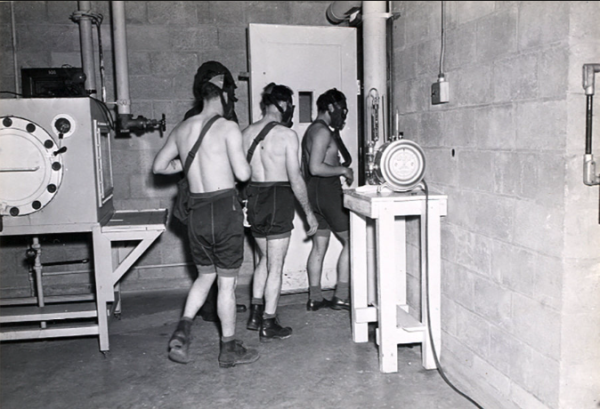
March 1945 Mustard Gas Tests – Edgewood Arsenal Subjects (Photo: U.S. Army)
As first reported by Stars and Stripes, Vietnam-era Veterans who were exposed to chemical agents and hallucinogens in classified military experiments are appealing for retroactive disability benefits following a recent federal court ruling that determined their constitutional rights were violated.
These Veterans, now in their 70s and 80s, participated in a secret research program at Edgewood Arsenal, Maryland, conducted by the U.S. Army Chemical Corps from 1955 to 1975. The program involved testing nerve agents, hallucinogens, and other toxic substances on military personnel, many of whom have since developed serious health conditions.
The classified Cold War program at Edgewood Arsenal was part of an effort by the military to research chemical warfare agents and develop defenses against potential threats. During these experiments, the participants were exposed to a wide range of chemical agents, including sarin, VX, tear gas, and hallucinogens like LSD. Although they were told the experiments were voluntary, many later revealed they were not fully informed of the health risks.
Additionally, they were bound by secrecy agreements that prevented them from speaking about the tests or the health problems that followed. These agreements, enforced by the threat of criminal penalties, also restricted them from seeking disability benefits from the VA for decades. The testing involved around 7,000 military personnel, and it continued until the program was disbanded in 1975.
Health conditions linked to these experiments include cancer, paralysis, depression, and post-traumatic stress disorder. For years, the VA denied these Veterans the benefits they were entitled to because the tests remained classified and the government did not acknowledge their existence. However, in 2023, a U.S. Court of Appeals ruling allowed these Veterans to seek retroactive disability benefits, arguing that the government’s secrecy agreements had violated their due process rights.
This ruling has opened the door for thousands of Veterans who participated in the Edgewood experiments to file claims for benefits dating back to their discharge from the military. According to estimates, around 3,000 to 5,000 of the original participants are still alive today. Despite the court’s decision, many of these Veterans are still encountering delays and denials from the VA, which claims to have a process in place for evaluating these cases but has not released data on how many claims have been processed.
While the secrecy surrounding these tests has slowly been lifted over the years, it was not until recent legal challenges that Veterans began to receive recognition for the injuries they suffered as a result of their participation.
As these Veterans pursue their claims, they seek not only compensation for their own suffering but also justice for their fellow Service Members who endured similar experiences. Many hope that they will finally get the support they deserve after decades of silence and struggle.